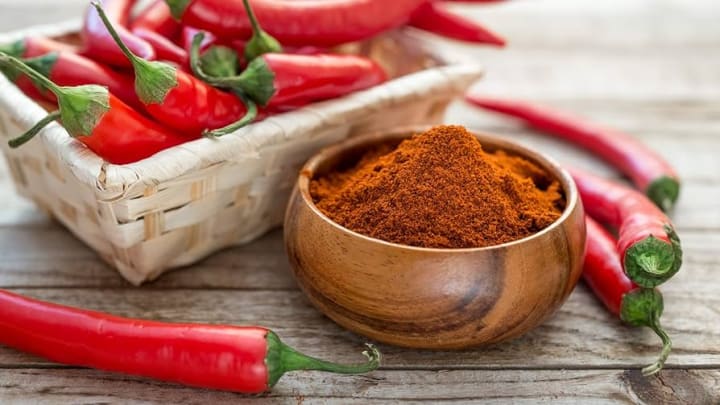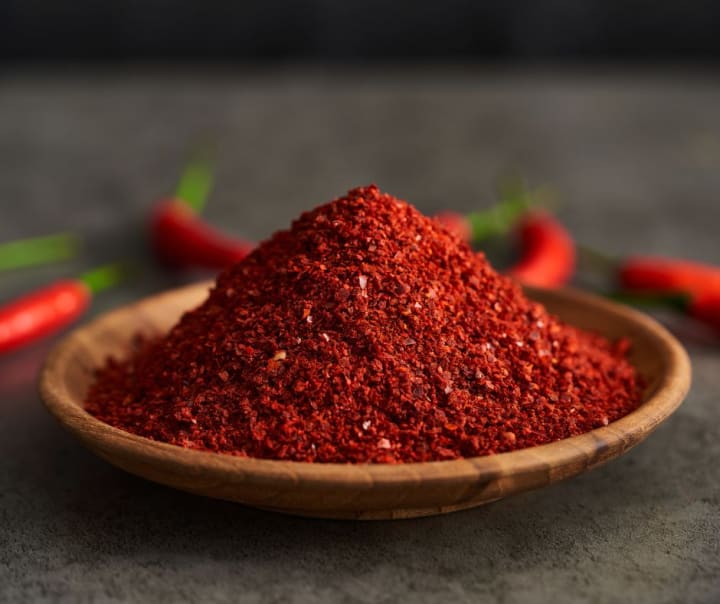Cayenne pepper: Is the chili that appears in many celebrity weight loss recipes really as good as rumored?
Cayenne pepper (Capsicum annuum) is a moderately hot, spicy pepper from the Solanaceae family (nightshade family) that is widely used in cooking and weight loss recipes. So does Cayenne pepper really help with weight loss and improve health?

- Calories: 18
- Protein: 0.8 grams
- Fat: 0.19 grams
- Carbs: 3.9 grams
- Fiber: 0.67 grams
- Vitamin C: 64.8 milligrams (mg), or 72% of the recommended daily value (DV)
- B6: 0.228 mg, or 13% DV
- Vitamin K: 6.3 micrograms (mcg), or 5% DV.

1. Rich in antioxidants and anti-inflammatories
Cayenne pepper is a rich source of antioxidants, which help protect cells from damage by neutralizing highly reactive compounds called free radicals.
One of the most common phytochemicals found in cayenne pepper is capsaicin, the pungent alkaloid compound responsible for cayenne pepper's spicy flavor that has been shown to have powerful anti-inflammatory and antioxidant properties.

Cayenne peppers have also been shown to have higher antioxidant activity than other peppers, including habanero peppers. This is due to the higher phenol and capsaicinoid content in cayenne peppers.
2. Reduce cold symptoms
According to Medical News Today, a 2016 study showed that the capsaicin compound in cayenne pepper can reduce symptoms such as sneezing, nasal congestion, and runny nose after colds and allergies thanks to its effect on the muscles. Blood vessels are dilating in the nose and throat.
The high beta-carotene content in cayenne pepper also helps prevent allergic conditions by breaking down and removing mucus caused by congestion.
3. Does cayenne pepper help lose weight?
According to Medicinenet, cayenne pepper helps increase metabolism. This means that using cayenne pepper regularly in small amounts can assist the body in burning more calories and more effectively.
A study shows that the capsaicin compound in cayenne pepper also helps reduce the production of the hunger hormone ghrelin, which will help you eat less and support a more active weight loss process.

4. Protects the heart and improves overall health
Therefore, adding cayenne pepper to a well-rounded diet can help increase absorption of protective plant compounds and nutrients that can promote and protect overall health.
According to Healthline, a large 2021 review of four observational studies found that chili pepper consumption was associated with a lower risk of all-cause mortality. Although these findings are promising, this does not mean that eating chili peppers every day will protect you from chronic diseases.
If you are trying to improve your health, it is best to look at your entire diet rather than focusing on one food like cayenne pepper. Eating plenty of fresh fruits and vegetables, getting enough sleep, learning to manage stress, and getting regular physical activity are much more important to improving your overall health.
5. Reduce the amount of salt consumed
Although salt is an important component for bodily functions, consuming too much salt has been linked to health conditions such as high blood pressure and heart disease. Cutting back on salt can help reduce your risk of heart disease and support the health of your entire body, including your kidneys and immune system.

Interestingly, using cayenne pepper to flavor your food can help you cut down on your daily salt intake. This is because the capsaicin in cayenne pepper can increase the taste of saltiness in food, thereby reducing the need to add salt to that dish.
According to Health, studies show that people who have a habit of eating spicy food also have lower blood pressure and less salt consumption than people who do not like spicy food. However, participants in this study felt more craving sweets and fats after eating soup containing cayenne pepper, so we still need more research before concluding how cayenne pepper affects cognition. a person's taste buds.
6. Possible side effects of eating cayenne pepper
Cayenne pepper, both fresh and dried, is safe to eat, but consuming large amounts of cayenne pepper can lead to some serious side effects, as high doses of capsaicin can affect heart rhythm and increase blood pressure, leading to negative effects on heart health and an increased risk of heart attack in severe cases. This can be especially dangerous for people with pre-existing heart conditions, such as arrhythmia or irregular heartbeat.
Additionally, consuming large amounts of cayenne pepper can cause stomach upset and worsen acid reflux symptoms.
If you are sensitive to spicy ingredients, you may experience a burning sensation in your mouth and swelling of your lips, especially when eating fresh chili peppers with seeds. The capsaicin in fresh cayenne peppers can cause corneal burns when exposed to the eyes.
Capsaicin may also interact with certain medications including: anticoagulants, aspirin, stomach acid - reducing drugs, ACE inhibitors... Talk to your doctor first if you intend to use cayenne pepper and are taking prescription medications.
About the Creator
HK Decor
Telling stories my heart needs to tell <3 life is a journey, not a competition
If you like what you read, feel free to leave a tip,I would love some feedback
https://sites.google.com/view/hk-decor/trang-ch%E1%BB%A7
Enjoyed the story? Support the Creator.
Subscribe for free to receive all their stories in your feed. You could also pledge your support or give them a one-off tip, letting them know you appreciate their work.






Comments
There are no comments for this story
Be the first to respond and start the conversation.